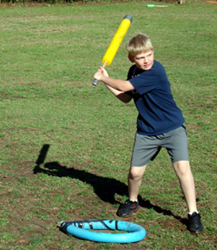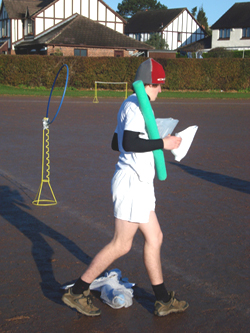Peter Hastie
Research
Research
| About us | research | publications | FOR PROSPECTIVE GRADUATE STUDENTS |
|
Sport education is a curriculum and instruction model that provides authentic sport experiences for physical education students. Its key features derive from how sport is conducted in community and interschool contexts. Ideally, it combines direct instruction, cooperative small-group work, and peer teaching. Its goals are to help students become competent, literate, and enthusiastic sports persons. My research to date on the model has progressed from original descriptions of students' and teachers' responses to the model, to more contemporary issues concerning the achievement of the goals of competence. Studies have been conducted in the US, Australia, Russia, Portugal and Spain, with similar outcomes across settings. Students prefer Sport Education to their more traditional teacher-directed lessons, and have been shown to learn their skills in more appropriate ways. Methodologies have included quantitative measures of engagement, skill and tactical development, as well as game literacy, while qualitative methods have included interviewing, interactive journals and drawing analysis.
|
||
|
By definition,
student designed games is a
process used in physical education where
students create, organize, implement,
practice, and refine their own games within
certain limits presented by the teacher.
These games are considered a major tool for
enhancing student interest, and some have
suggested they often bring forth more
interest than do teacher-designed games. Studies have been conducted in the US and the UK, seeking to determine the processes through which students go about designing their games, and detecting differences between students' gender and skill level. Also studied has been the learning that has taken place during game design. Methodologies have included action research, ethnographic field studies, and the use of wikis and other educational technologies during both instruction and data collection.
|
||
|
Classroom
ecology
studies focus on the classroom micro-system,
seeking to describe and explain the
interactions of students’ thoughts and
behaviors with teachers’ management of
academic goals and learning tasks. The ecological paradigm conceptualizes teaching-learning as a set of interrelated task systems, all of which are influenced by the accountability strategies utilized by the teacher. In physical education, the instructional tasks system deals with the academic work of the class, while the managerial system deals with behavior and organizational requirements. Methodologies have included mostly mixed methods research -- where quantitative accounts of student engagement and teacher behaviors are supplemented by field observations and interviews.
|
Last Updated: September 6, 2013






